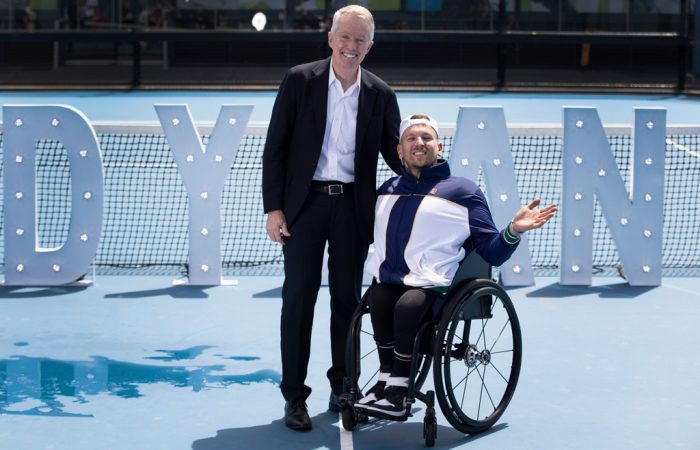“It doesn’t just happen”: Celebrating access for all
On International Day of Persons with a Disability, Dylan Alcott and Tennis Australia CEO Craig Tiley discuss the important messages that the day promotes.
On International Day of Persons with a Disability, Dylan Alcott and Tennis Australia CEO Craig Tiley discuss the important messages that the day promotes.
Australia, 3 December 2021 | Darren Parkin

The Dylan Alcott legacy will stretch well beyond his remarkable on-court achievements.
As we celebrate International Day of Persons with a Disability, the world No.1’s contribution to not only tennis but also the lives of many people more broadly, is clear.
When not training or on the court, Alcott manages his company, Get Skilled Access. It seeks to create a new generation of disability inclusion that is equitable for all.
It’s a message that Tennis Australia CEO Craig Tiley believes is a cornerstone for Australian tennis, thanks in part to Alcott’s legacy.
“One of our key strategic pillars around tennis in Australia is inclusivity and diversity,” Tiley said.
“We try to live that every single day. We’ve got four-and-a-half thousand tennis clubs across Australia, and they’ve got to understand that too.
“I think we are fortunate in our sport to have fantastic examples like Dylan and so many others as well.”
For a proud Alcott, there was a moment that highlighted the level of inclusion in Australian tennis.
“Probably one of the coolest moments I remember well, is one of the first or second times playing at Rod Laver Arena, looking and seeing 500 kids in wheelchairs, across the top ring of (Rod Laver Arena) and I couldn’t believe it. It almost made me cry” Alcott said.
“And even putting us on Rod Laver Arena, you don’t do it for that reason, you just do it because you should do it.
“But one thing I love about Tennis Australia is that inclusion is legit’ entrenched in everything that is done at the Australian Open and Tennis Australia.”
International Day of Persons with a Disability has been acknowledged and promoted by the United Nations since 1992.
Supported by the Australian Federal Government since 1996, the day is aimed at increasing public awareness, understanding and acceptance of people with disability.
Tiley stresses that the message is far-reaching across every aspect of tennis, from participation to employment and fan engagement.
”Our objective is free and easy access for anyone in the community, in Australia, and anyone coming from outside of Australia to visit,” Tiley said.
“We’ve got to create an environment to do that. And some people need a ramp, some people need a place to be dropped off closer to the event, some people need a health centre. Whatever it is, you’ve got to provide it.”
It’s about starting conversations, changing perceptions and providing opportunities, and then continuing them all year round – so we can continue to work together to make a society that is inclusive for all xx #IDPWD #disability pic.twitter.com/IHkeauQ3MP
— Dylan Alcott (@DylanAlcott) December 2, 2021
Alcott explains how developments in promotion, facilities and support have increased opportunities grow for athletes faced with a disability.
“I feel like the physical accessibility features have got better and better. They’ve always been there as well, but I think what we call it at GSA, which is the software and the understanding, means the unconscious bias is left at the door and people are really included,” he said.
“And tennis is such a diverse sport. All ages, all races, all backgrounds, all abilities.”
Tiley acknowledges Alcott’s leading role in that process.
“You’ve helped put it more on the map than it ever was before, you’ve raised the bar,” he told Alcott.
“Just to see what you’ve done on court; I don’t think you realise yet the impact that your participation and your attitude has.
“These things don’t just happen like this, someone really drives and pushes them.”
Alcott emphasises the importance of a big-picture focus. “I’ll be the lucky one, and I want to leave it in a better spot for the next generation,” he surmised.
But Australia sets a great standard for other organisations to follow in terms of diversity and inclusion, especially for people with disabilities – not only because of the access and the training, but also employment and wanting to stick your neck out and say, ‘we want to do better’.”
